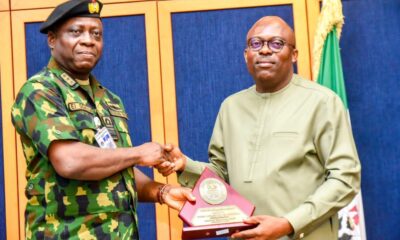Entertainment
Life And Times Of Goddy Oku
“In his book, ‘The Wings’, drummer-turned-guitarist, Manford Best, wrote extensively and glowingly of the pivotal role Goddy played in his music career, in the face of his (Manford’s) natural challenge”
On Friday, January 19, 2024, Chief Tony Okoroji, the Chairman of Copyright Society of Nigeria (COSON), Chief Uche Emeka Paul, Sir Angus Power Nwangwu and other members of COSON were in Ukpo, Dunukofia Local Government Area, Anambra State to pay the last respects of COSON to Engr Goddy Ogomegbunam Oku. Describing Oku as an “iconic musician…long-term motivator of the music industry…leader of the Hygrades, proprietor of Godiac Studios…a great man and a true genius”, Chief Okoroji draped the casket with the flag of COSON. To perform this rite of passage, Okoroji flew in from Lagos, Paul flew in from Abuja, Nwangwu drove in from Enugu and other members arrived from various states reflecting the esteemed regards Goddy Oku commanded in the COSON family. My experience with Goddy Oku and those of others as contained in the following dirge epitomise the essence of Okoroji’s graveside oration. Goddy was really a “long-term motivator of the music industry”.
During the Nigerian civil war, my family took refuge in Umuchima, down the valley at the outskirts of Orlu, Imo State. One evening, my father returned from Orlu with a message from my friend, Emeka Ifejika, that Biafra Army Officers Training School (BAOTS) was setting up a pop band and they were searching for a bass guitarist. Goodness gracious!!! I was the bassist of The Hardnuts, my defunct teenage band in Port Harcourt; so, I saw it as the opportunity to avoid conscription, which had intensified at the time. Very early the next morning, I sneaked through the back into the sprawling scenic compound of Bishop Shanaham College, Orlu, which housed BAOTS and, as God would have it, I met Goddy Oku. For three hours, he drilled me on bass guitar playing, basic chord progressions and eventually accepted me as bassist/vocalist of the proposed band. An identity card and a “Pass” were quickly prepared to enable me return to Umuchima the next day, pick up my personal effects and report for duty.
With Dona Dyke (Donatus Nwadike) on drums and Goddy on lead guitar/vocals, we became The Silhouettes, a power trio that played side-by-side Sunny Nwamama of “Umunwanyi ji ukwu achodi” fame. That was at a time Jimi Hendrix Experience, James Gang, Emerson, Lake & Palmer, Cream, Grand Funk Railroad and other Power Trios were hip in Europe and America but hadn’t emerged in the West African music scene; so, our ensemble was peculiar or odd, if you prefer.
One day, Warrant Officer Murphy introduced a young man by name Justus Nnakwe (JU-Xperience) to Goddy and appealed that he (Justus) should be taught an instrument. Within two weeks, Goddy drilled Justus and transformed him from a complete neophyte to a rhythm guitarist. Eventually, JU had his first outing and The Silhouettes morphed into a four-some at an event for the Commandant of BAOTS, Colonel Tim Onwuatuegwu. Thereafter, Goddy groomed a singer whose entry gave the band a greater body and earthy sound. At the end of the civil war, I returned home to Port Harcourt, Rivers State, cofounded The Blackstones Band in January 1970 and chased the stars until 1972 when societal and family pressure leashed me back to school in the United States where I consistently earned pocket change thru playing guitar; the trade in which Goddy Oku groomed and gowned me.
Goddy mentored numerous artists in his days; the list is virtually endless. Sonny Okosuns, John Kerry, Nelly Uchendu, Panam Percy Paul, Chris Okotie, Felix Liberty, Felarday, Clement Amaechi and a host of others. Kenny Koburn (KK) once reminisced on how he broke bounds in high school to watch The Blackstones perform at Golf Course Hotel, Owerri in the early 1970s. Enamored by the performance of the bassist of the band, KK said he dropped out of school and headed to Enugu where he was tutored to play bass guitar by Goddy Oku. Subsequently, KK co-founded Founders Fifteen of Port Harcourt. In his book, ‘The Wings’, drummer-turned-guitarist, Manford Best, wrote extensively and glowingly of the pivotal role Goddy played in his music career, in the face of his (Manford’s) natural challenge. Before his demise, Prof Frank Onyezili (Frank Zilly of The Fractions) narrated to me the crucial role Goddy played in his music career before he returned to school. Goddy it was who played the classical guitar interlude in “Igede” by Celestine Ukwu. Arguably, “Igede” stands out as the first instrumental music in the Highlife genre and one of the most memorable songs of Celestine Ukwu.
Over the years, Goddy and I maintained contact and I visited him periodically. We even planned that he’d do one week with me in Port Harcourt and we’d embark on a musical pilgrimage to Abak, Akwa Ibom State to visit Emmanuel Ntia of Solo Hit fame, but that didn’t come to fruition. However, when JU came home in April 2021, I hopped into Enugu on the 13th and the three of us spent one night of reminiscences. We put two mattresses on the floor in Goddy’s parlor and played guitar and talked all night. We relived our collective experiences and walked through the engagements we played during the civil war. It was a memorable night.
JU Xperience, Goddy and
The next morning, April 14, 2021, we took a group photograph without realising that that would be the last time we’d see each other. First, JU sailed to the great beyond in far away China and now Goddy is gone; a rather grim reminder of my sitting at the “Departure Lounge of Life”.
May the creative soul of Godfrey Ogomegbunam Oku rest in the Bosom of God, Amen.
Jason Osai
Entertainment
Davido Narrates How His Song Became President’s Ringtone
Nigerian megastar, Davido shares how his father recognised that his music was getting big.
Davido says his hit single ‘Dami Duro’ was the president’s ringtone
During an interview with newsmen, Davido spoke on the early days of his career and how he eventually got his father’s approval to make music.
The Grammy nominee shared the familiar story of how he left school in Atlanta and returned to Nigeria to pursue music without his father’s blessing which later led to his business mogul dad getting him arrested.
“I don’t think he did not want me to do music, he just wanted me to be successful as whatever I did because he got a blueprint for me already,” Davido said on his father’s early reaction to his decision to make music.
“He is so supportive and he checks on everything…My dad picks my album. When I am done, I send him all the tracks and my dad goes through all the records and gives me a paragraph each,” Davido narrates the personal interest and support his Dad gives him.
“My dad gave me the name Davido…The first show I did, he arrested me, the fans, the promoters,” Davido said laughing as he narrated the story of how his father got him arrested after he returned to Nigeria without his consent and had his first show as a 17-year-old. “He just wanted me to finish school,” Davido added about his father’s insistence that he get a university degree.
The three time Grammy nominee was asked when his father recognised that his music was getting big and he revealed it was when his hit song ‘Dami Duro’ was the president’s ringtone.
“When my song was the president’s ringtone,” Davido said.
While he did not mention the president or the country, Davido is likely referring to the exploit of former Nigerian president Goodluck Jonathan who was the head of state between 2010 – 2015.
During the interview, Davido also mentioned his plans as a businessman beyond music. He revealed he had a production house called Coco House which he describes as a media house for creatives. He also added that he intends to get into crypto.
Entertainment
Funke Akindele’s New Film Premiers, Dec
Nollywood actress and filmmaker, Funke Akindele has announced that her upcoming film, Everybody Loves Jenifa, a spinoff from the Jenifa franchise will premiere in December.
“Been long you saw Jenifa!!!!” Akindele said.
While a December premiere is confirmed, details on the film remain unknown. However, the new title, Everybody Loves Jenifa, suggests a potential return to the core elements that have made the franchise popular. With Akindele leading the creative team, viewers can anticipate the return of familiar characters and humorous storylines.
The sitcom, Jenifa’s Diary has been a major Nigerian television show since its debut in 2015. The series centres around the main character played by Akindele, and has featured Folarin “Falz” Falana, Lolo, Juliana Olayode, Lota Chukwu, Paschaline Alex Okoli, and late Aderounmu Adejumoke.
The Tide Entertainment reports that it has also had spin-offs and sequels like Aiyetoro Town (2019), which is set in Jenifa’s village, and Jenifa on Lockdown (2021).
Akindele played Jenifa in the first film in the franchise, Jenifa (2008), a village girl who travelled to the city in pursuit of fortune. Muhydeen S. Ayinde directed the movie.
The movie was nominated for four Africa Movie Academy Awards in 2009 including, Best Original Soundtrack, Best Actress in a Supporting Role, and Best Nigerian Film. For her performance in this movie, Akindele took home the Africa Movie Academy Award for Best Actress in a Leading Role.
Entertainment
Halliday Attributes Collaboration Hindrance To Sentiments, Others
The convener, South South Media Week, Tammmy Halliday has attributed the lack of unity and collaboration in the PortHarcourt entertainment industry to sentiments, baggages and trust issues.
He made this known yesterday, during an interview with newsmen in Port Harcourt.
According to him, some things that spur baggages are family background, personal experience with colleagues or other people, saying that when someone has been reaped or used by any of his colleagues or someone else, he might not want to work with some other persons because of trust issue.
This goes along with baggages, where he now sees his other colleagues as one and same with the one who used him and so this continues to hinder collaborations in the industry.
He advised that as an entertainer you should get better, visible and exposed as the industry required.
He said that the key factor that can help collaboration is growth, explaining that growth would make entertainers live beyond baggages, adding that if you are good at what you do, and know what you want and where you are going with it , then you are good to go.
“You can seek an advice from a legal practitioner, professional or a senior colleagues to ensure that you (entertainer) get it right.
It is not a bad idea to serve or work with someone, because you serve to rise in the industry. You have to be well rooted, but, you should be able to know want you want and where you are going with what you do, this will help you move on, when it is no longer working for you, otherwise, you will remain there and keep complaining and then it gets to that point where you begin to see that person as a reaper,” he said.
Mr Halliday who also do corporate social responsibility award via his platform, South South Media Week stated that critical communication is important in any situation, with a critical approach, no doubt you will always be on the right track.
Speaking on criteria for awarding awards, he maintained that it is on numbers, affiliations, fanbase, followership, association and sales of the person or organisation in question, saying that these also works for collaboration with an artiste, because they are factors that facilitate growth in the industry.
Categories of award that are awarded through the platform includes, entrepreneur award of the year, innovation award of the year and others.
Nancy Briggs
-

 News1 day ago
News1 day agoBonny-Bodo Road: FG Offers Additional N20bn, Targets December Deadline
-
Business1 day ago
Nigeria Set To Get $2.25bn World Bank Loan … Plans Diaspora Bond
-

 Niger Delta1 day ago
Niger Delta1 day agoMile One Market: Committee Commences Verification Exercise …Denies Allocations Of Shops
-
Sports1 day ago
Chairman Lauds NPFL Referees Improvement
-

 News1 day ago
News1 day agoJAMB Arrests Father For Impersonating Son At Exam Centre
-
Women1 day ago
The Desire Of Every Woman In Marriage
-

 Featured1 day ago
Featured1 day agoBe Firm In Fight Against Oil Theft, Fubara Tells CNS …As Navy Moves Training Hqtrs To Rivers …Seizes 14 Vessels In Three Months
-
Business1 day ago
Diri Tasks NCDMB, SPDC On Projects Completion

